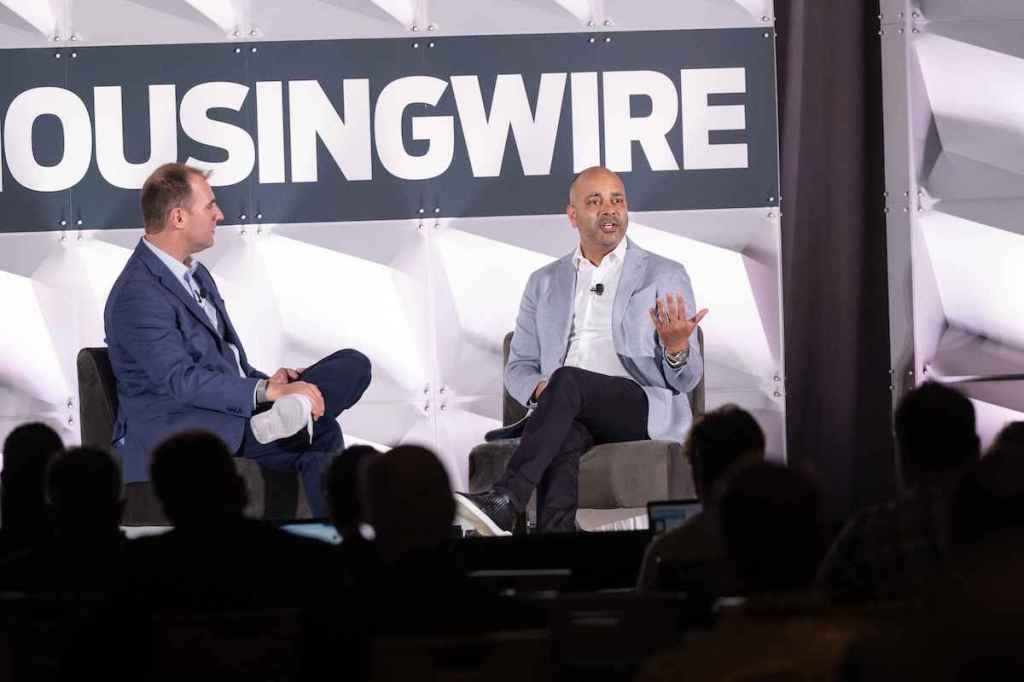Rocket Companies, the parent company of Rocket Mortgage, hired its first chief technology officer this week, bringing former Thomson Reuters and Intel executive Shawn Malhotra into the fold. The hire is Rocket’s latest move to bolster its already robust investment in artificial intelligence.
Varun Krishna, Rocket Companies CEO, sat down with HousingWire CEO Clayton Collins at The Gathering event several weeks ago to talk about the company’s AI strategy and their new AI tool, Synopsis.
This interview has been edited for length and clarity.
Clayton Collins: You entered this business and this industry at a relatively challenging time. What’s your charge in year one as CEO?
Varun Krishna: The simple answer is just growth and how you think about strategy that drives sustainable growth, leveraging your assets, your capabilities and your durable advantages. As a technologist, one of the biggest strategic imperatives that we have is to bet big on technology, and specifically AI technology. In fact, we have a platform that we launched a couple of weeks ago that we call Rocket Logic AI. Think about it as a proprietary loan origination platform that touches every single aspect of the Rocket stack — from the digital experience that a consumer interacts with, to the systems that they use when they’re interacting with a loan officer, to the way that we handle documents extraction, income verification, underwriting and client experience.
All of this is built on an AI stack that leverages our proprietary data. You have to have a lot of data and you have to have a lot of capability to work with that data. And so when you have a company that has 10 petabytes of data, 65 million call logs, just having all of this semantic understanding of the homeownership process gives you the right to create an AI platform.
So that’s a big strategic imperative — we put a lot of resources behind it. We’re already seeing some pretty awesome results. We’re able to close loans two and a half times faster than the industry. And the good thing about AI technology is you just keep building on it faster and faster and faster. In fact, we actually have an amazing new tool that I wanted to talk to you about today, that we’re actually unveiling at this conference, called Synopsis.
CC: Tell me more about Synopsis.
VK: The way Synopsis works is it essentially uses generative AI to understand the context of human-to-human conversation. In the homeownership journey, the consumer has a lot of conversations: they talk to a loan officer, they talk to a client experience specialist, they may talk to someone in the servicing experience. So there’s a lot of data that comes from that context and what this tool does is it essentially transcribes, interprets, understands and predicts all kinds of aspects around the consumer mindset — even things like sentiment.
To give you a concrete example, let’s say I’m your loan officer and we’re having a conversation into the night and you happen to mention that you work late hours. This tool can basically understand that and automatically create a workflow that ensures that we don’t call you in the morning because you’re probably going to be sleeping. And so it allows us to deliver these incredibly bespoke client-specific experiences that deliver the next level of personalization.
The homeownership journey is a very emotional journey and the better you can understand a client’s context, the more personalized you can make an experience. As another example, we’re going to be expanding this tool to every aspect of our human-to-client interaction with our team members. We use it right now just in our client experience operations area and we’ve seen a 10% improvement in a really important metric, which is our first call resolution — basically, the first time you got a call, how long did it take to resolve? That alone is going to save us around 20,000 hours.
CC: Is that primarily in the servicing portfolio?
VK: That’s in the client experience, but we then are going to apply it to servicing and we think the same benefit is going to save us another 40,000 hours a year. So in totality, you take that and you put it on top of the Rocket Logic platform and you’re talking 170,000- 180,000 hours a year of just effort saved, which allows us to focus on more clients and to be able to grow our business.
CC: So that time savings will translate into cost efficiency. How does that impact the consumer? Will consumers interact with Synopsis personally?
VK: This is a tool that essentially powers our team members with AI and super charges them. The great thing about AI is it’s at the nexus of humanity and technology. That’s what I love about it. It allows computers to do what they do best and allows humans to do what they do best. And so the technology is more invisible to a client, except for the fact that it just simplifies things like automation, personalization and you submit a document, it’s extracted faster.
But what it really does is it just gives our team members the ability to understand context. And it’s a very powerful tool. It’s built on AWS, and Amazon Bedrock, which is a state-of-the-art AI platform. And then it sits underneath our large language models where we have those 65 million call logs and 10 petabytes of data. We’re just gonna keep feeding more data to the tool and training it and apply it in more and more places in the market.
CC: That’s a big bet. So you’re using the big servicing portfolio with all the client interactions to train the language model. At HousingWire, as we’ve talked about AI and the industry, we’ve always thought the biggest players have an advantage because of the pure scale of data. They also have the most to lose in rolling out game-changing technology in an organization that has millions of consumer touch points. How do you think about managing the risk and reward of rolling out such impactful platforms?
VK: We have a very disciplined testing methodology that we use whenever we deploy models and one of the things we do is we keep a human in the loop to validate and check our models to make sure that they’re fair, that they’re accurate and that their performant.
The other thing that I would say is the reverse also applies, because human beings are far from perfect creatures. And so, when you have a lot of folks that are having these kinds of phone calls and conversations, you are also able to leverage models to understand and interpret those conversations. So you have this reinforcing feedback loop that’s created, when the machines are helping to make sure that humans are performing at an optimal level.
But it also provides the other feedback effect to ensure that models are free of bias, that there’s fairness and that the models are actually creating a better experience for the end client. We have a lot of metrics that we use to measure that, but it’s an important philosophical way of how we develop ethical AI.
CC: What’s been the Rocket team member’s reaction to Synopsis?
VK: The feedback has been incredibly positive because you feel like you’re given a superpower. You understand that this client looks like this particular situation and you’re able to provide predictive advice. When you have software that can predict a situation that’s going to happen, it puts your team member one step ahead of the game. And in the homeownership journey, that certainty is so important to the client.
The team member understands the client’s emotional state and can provide reassurance at the right moment in time, so the feedback from the pilot that we’ve got with client experience has been very positive.
Most of our servicing is very much powered by generative AI and there’s a lot of data that comes in through our chats and chat dialogues. And the good news is the technology only gets better because there’s a feedback loop. You’re continuing to feed data as you learn on what’s working well, what’s not working well. So the models get more sophisticated and better, which ultimately creates data on top of data — which I think is really the key to building a successful AI platform.
CC: In the market, Rocket has developed a reputation for being a very strong refi lender, but in addition to technology, you’ve also talked about an increased focus on the purchase side of the business. Can you go deeper on your strategy to strengthen the purchase capabilities of Rocket?
VK: We have a very healthy servicing business and we obviously have a very healthy refi business. But purchase is really an opportunity to drive a better client experience on both sides: the act of buying a home, selling a home, listing a home, and all the stakeholders that are involved, the mortgage broker, the Realtor, etc. And this is where our AI platform is strategically relevant just because most of the friction in the purchase experience has to do with things that AI can really improve and automate and simplify. So strategically, you can expect us to be talking a lot more about purchase.
Our Rocket Homes team is doing some pretty incredible things with AI. We just launched a feature that we call AI-driven photo tagging, where we use image engineering to understand what’s in a photo so you can search for a home based on wide plank, French oak floors. We’ve invested in features that make the Rocket Logic AI platform more geared toward purchase, but obviously we have substantial strengths and refi and servicing as well.






